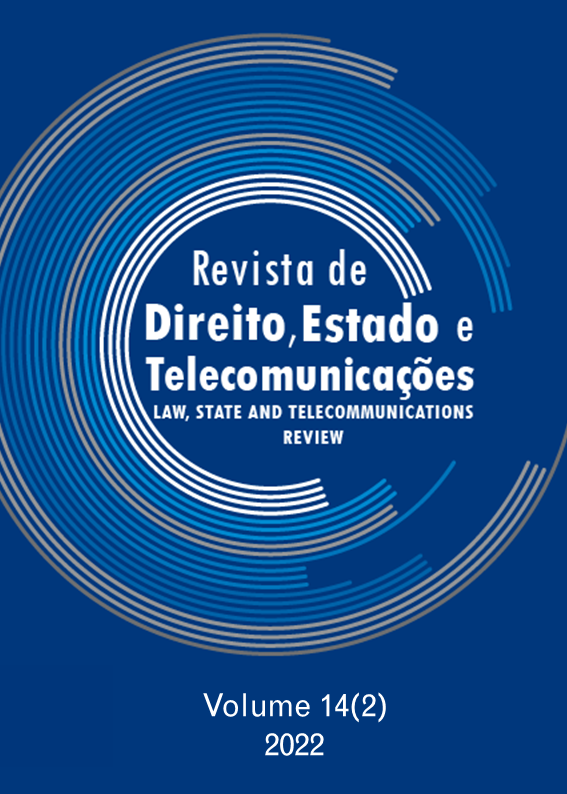International Legal Regulation of Activities for the Safe Use of Outer Space
DOI :
https://doi.org/10.26512/lstr.v14i2.40361Mots-clés :
Insurance. Safety of Space Activities. Outer Space. Licensing. Space Policy. International Legal Regulation.Résumé
[Purpose] It is impossible to imagine the life of a modern person without space technologies. International crews of astronauts have been working in orbit as part of the International Space Station for the past fifteen years. The purpose of the study is to assess the problems of legal regulation of activities related to the use of space communications.
[Methodology] According to the specifics of the subject and the purpose of the research, we applied dialectical, historical, comparative and system-structural methods.
[Findings] The international legal instruments of general statutory load on outer space subjects and specialised regulation with a focus on individual aspects of the safety of space activities were studied. To clarify the scope of relevant objects of outer space, the causes of emerging dangers as a result of space activities were identified. The development of a set of regulations for the commercial use of space communications was demonstrated.
[Practical Implications] The practical significance of the study is determined by the fact that the safety of space activities in recent years has become one of the most serious problems of space activities.
Références
Antoni, N., Giannopapa, C., & Schrogl, K. (2020). Legal and policy perspectives on Civil–Military cooperation for the establishment of space traffic management. Space Policy, 53, Article number 101373.
Avdeev, V. A., Avdeeva, O. A., Shagieva, R. V., Smirnova, V. V., Mashkin, N. A., & Taradonov, S. V. (2019). The mechanism of legal regulation in the conditions of globalization and formation of information environment. regional aspect. Journal of Environmental Management and Tourism, 10(7), 1517-1521.
Blevins, J. L. (2014). Political economy of corporate power and free speech in the United States. Media Watch, 5(2), 209-222.
Declaration of legal principles for the Activities of States in the Exploration and use of outer space. (1963). Retrieved from: https://www.unoosa.org/pdf/gares/ARES_18_1962E.pdf. Access date: 18 September 2021.
Declaration of the Guiding Principles. (2012). Retrieved from: http://www.unesco.org/new/fileadmin/MULTIMEDIA/HQ/CI/WPFD2009/Russian_Declaration.html. Access date: 22 September 2021.
Declaration on Principles of International Law Concerning Friendly Relations and Cooperation among States in accordance with the Charter of the United Nations (1970). Retrieved from: https://legal.un.org/avl/ha/dpilfrcscun/dpilfrcscun.html. Access date: 11 September 2021.
Final Act of the Conference on Security and Cooperation in Europe (1975). Retrieved from: https://www.cvce.eu/en/obj/final_act_of_the_conference_on_security_and_cooperation_in_europe_helsinki_1_august_1975-en-26511c7f-1063-4ae9-83e5-16859194a144.html. Access date: 16 September 2021.
Fry, E. K. (2012). The risks and impacts of space weather: Policy recommendations and initiatives. Space Policy, 28(3), 180-184. https://doi.org/10.1016/j.spacepol.2012.06.005
Greenberg, J. S. (1993). Competitiveness of commercial space transportation services. Space Policy, 9(3), 220-232. https://doi.org/10.1016/0265-9646(93)90056-F
Gugunskiy, D., Chernykh, I., & Khairutdinov, A. (2020). Legal models for activities on the exploration and utilization of space resources: Towards the “space-2030” agenda. Advances in Intelligent Systems and Computing, 1100, 657-664. https://doi.org/10.1007/978-3-030-39319-9_73
Hitchens, T. (2021). Norm setting and transparency and confidence-building in space governance. War and Peace in Outer Space: Law, Policy, and Ethics, 1, 70-105. https://doi.org/10.1093/oso/9780197548684.003.0003
Hofmann, M., & Blount, P. J. (2018). Emerging commercial uses of space: Regulation reducing risks. Journal of World Investment and Trade, 19(5/6), 1001-1023.
Koivusalo, M. (2014). Policy space for health and trade and investment agreements. Health Promotion International, 29, i29-i47. https://doi.org/10.1093/heapro/dau033
Kokoeva, L. T., Kolieva, A. E., Gaytova, L. K., & Khadikov, M. K. (2019). The necessity for legal regulation of usage of new information technologies in management. Advances in Intelligent Systems and Computing, 726, 403-408.
Kulikpayeva, M. (2020). Correlation of international space law and national legislation in the field of space activities. Advances in the Astronautical Sciences, 170, 939-947.
Lester, D., & Thronson, H. (2011). Human space exploration and human spaceflight: Latency and the cognitive scale of the universe. Space Policy, 27(2), 89-93. https://doi.org/10.1016/j.spacepol.2011.02.002
Murphy, A. G. (2002). Organizational politics of place and space: The perpetual liminoid performance of commercial flight. Text and Performance Quarterly, 22(4), 297-316. https://doi.org/10.1080/10462930208616175
Obukhov, V. A., Kirillov, V. A., Petukhov, V. G., Popov, G. A., Svotina, V. V., Testoyedov, N. A., & Usovik, I. V. (2021). Problematic issues of spacecraft development for contactless removal of space debris by ion beam. Acta Astronautica, 181, 569-578. https://doi.org/10.1016/j.actaastro.2021.01.043
Salmeri, A. (2019). Houston, we have a law. A model for national regulation of space resources activities. Paris: International Astronautical Federation.
Solntsev, A. M. (2021). Ensuring environmental safety during the rocket and space activities. Advances in the Astronautical Sciences, 174, 513-520.
Spassova, S., & Bergamasco, F. (2018). The role of the ITU in the creation of international legal norms on cybersecurity pertaining to space communications. Paris: International Astronautical Federation.
Symmons, J. (2010). Policy and regulatory risk considerations for satellite communications. Space Policy, 26(2), 121-123. https://doi.org/10.1016/j.spacepol.2010.03.001
The Commercial Space Flight Act. (1984). Retrieved from: https://www.govtrack.us/congress/bills/98/hr3942. Access date: 27 September 2021.
The Constitution of the International Telecommunication Union. (1992). Retrieved from: https://www.itu.int/en/council/2019/Documents/basic-texts/Constitution-R.pdf. Access date: 18 September 2021.
The Law of the Republic of Kazakhstan “On Space Activities”. (2012). Retrieved from: https://online.zakon.kz/document/?doc_id=31112199. Access date: 15 September 2021.
The Law of the Republic of Kazakhstan “On the Radio Frequency Resource of Kazakhstan”. (2000). Retrieved from: http://adilet.zan.kz/rus/docs/V1500010730. Access date: 20 September 2021.
The Outer Space Treaty. (1996). Retrieved from: https://www.unoosa.org/oosa/en/ourwork/spacelaw/treaties/introouterspacetreaty.html. Access date: 18 September 2021.
Webb, D. (2015). The ethical use of outer space. Ethical Engineering for International Development and Environmental Sustainability. https://doi.org/10.1007/978-1-4471-6618-4_4
Wenzel, A. (2016). Eating together, separately: Intergroup communication and food in a multiethnic community. International Journal of Communication, 10, 620-641.
Yan, Y. (2019). Maintaining long-term sustainability of outer space activities: Creation of regulatory framework to guide the Asia-Pacific space cooperation organization and selected legal issues. Space Policy, 47, 51-62.
Téléchargements
Publié
Numéro
Rubrique
Licence
© Law, State and Telecommunications Review 2022

Cette œuvre est sous licence Creative Commons Attribution 4.0 International.
By submitting this paper to the Law, State and Telecommunications Review,
I hereby declare that I agree to the terms of the Creative Commons Attribution 4.0 International (CC BY 4.0).


